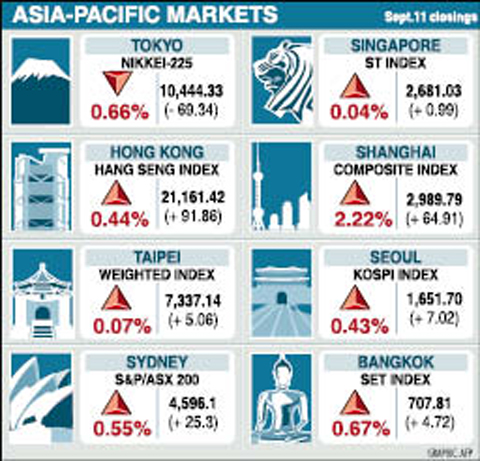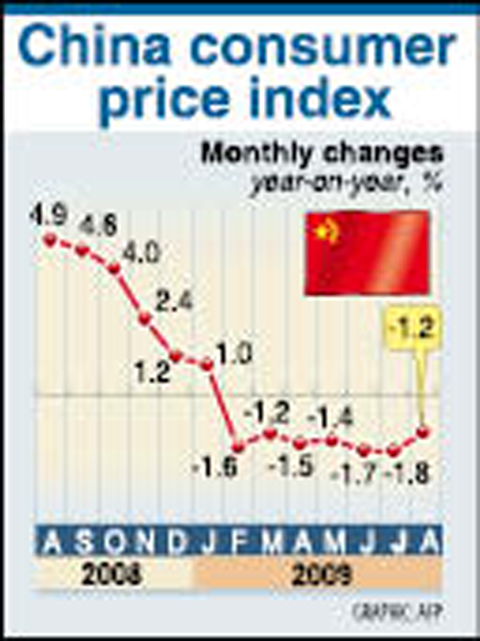Asian stocks rose 4.4 percent in the week to the highest level in a year as the G20 nations agreed on measures to shore up the financial system and China reported better-than-expected economic data.
National Australia Bank Ltd climbed 6.7 percent as G20 finance chiefs agreed on a regulatory blueprint to help avoid a repeat of the global financial crisis. China Unicom (Hong Kong) Ltd (中國聯通) rallied 6.9 percent after China’s industrial production rose last month from a year earlier.
“It’s clear there’s an ongoing commitment by the authorities to make sure this recovery works,” said Nader Naeimi, a Sydney-based strategist at AMP Capital Investors, which manages about US$75 billion. “Together with the evidence of a recovery we’re already seeing, it points to a continuing improvement in the economic outlook.”

The MSCI Asia-Pacific Index climbed 4.4 percent to 117.82 in the past five days, its seventh week of alternating between gains and losses. The gauge has surged 67 percent from a more than five-year low on March 9 on speculation the global economy is recovering.
China’s Shanghai Composite Index rose 4.5 percent in the week as the statistics bureau said industrial production increased 12.3 percent last month from a year earlier, beating the 11.8 percent median estimate of 15 economists surveyed by Bloomberg News. Urban fixed-asset investment for the eight months to Aug. 31 climbed 33 percent, more than the 32.7 percent median estimate in a survey of economists.
Japan’s Nikkei 225 Stock Average advanced 2.5 percent, even as the Cabinet Office reported that the country’s economy grew at a 2.3 percent annual rate in the second quarter, lower than the 3.7 percent expansion originally estimated.

Taiwanese share prices are expected to turn quiet next week as the market falls into a consolidation mode after recent gains, dealers said on Friday.
Interest in electronic heavyweights is fading as investors are likely to continue to take profits, while earnings concerns may also keep buyers at bay, they said.
For the week to Friday, the weighted index rose 184.01 points or 2.57 percent to 7,337.14 after a 5.04 percent increase a week earlier.
Other market on Friday:
SYDNEY: Up 0.55 percent. The S&P/ASX 200 climbed 25.3 points to 4,596.1.
SEOUL: Up 0.43 percent. The KOSPI added 7.02 points at 1,651.70. Financial stocks were mostly higher on hopes of improved earnings results in the second half, amid signs of worldwide economic recovery.
SINGAPORE: Flat. The Straits Times Index edged 0.99 points, or 0.04 percent, lower to 2,681.03. “I think everybody is just waiting for the weekend. Wall Street set a new [year-to-date] high overnight, but people are hoping for more good news,” a dealer at a foreign brokerage said. “How much money can you keep pumping in without taking something off the table?”
BANGKOK: Up 0.67 percent. The Stock Exchange of Thailand rose 4.72 points to close at 707.81.
KUALA LUMPUR: Up 0.59 percent. The Kuala Lumpur Composite Index gained 7.0 points to 1,208.28. The market is at a new high for this year.
JAKARTA: Up 0.17 percent. The Jakarta Composite Index added 4.08 points to 2,415.94.
MANILA: Up 1.23 percent. The composite index added 34.92 points to 2,870.83. “The US market broke out so this market has a chance to see if it can test higher resistance levels,” Nestor Aguila of DA Market Securities said.
WELLINGTON: Up 0.33 percent. The NZX-50 rose 10.50 points to 3,137.18.
MUMBAI: Up 0.29 percent. The 30-share SENSEX rose 47.44 points to 16,264.30.

Rainfall is expected to become more widespread and persistent across central and southern Taiwan over the next few days, with the effects of the weather patterns becoming most prominent between last night and tomorrow, the Central Weather Administration (CWA) said yesterday. Independent meteorologist Daniel Wu (吳德榮) said that based on the latest forecast models of the combination of a low-pressure system and southwesterly winds, rainfall and flooding are expected to continue in central and southern Taiwan from today to Sunday. The CWA also warned of flash floods, thunder and lightning, and strong gusts in these areas, as well as landslides and fallen

WAITING GAME: The US has so far only offered a ‘best rate tariff,’ which officials assume is about 15 percent, the same as Japan, a person familiar with the matter said Taiwan and the US have completed “technical consultations” regarding tariffs and a finalized rate is expected to be released soon, Executive Yuan spokeswoman Michelle Lee (李慧芝) told a news conference yesterday, as a 90-day pause on US President Donald Trump’s “reciprocal” tariffs is set to expire today. The two countries have reached a “certain degree of consensus” on issues such as tariffs, nontariff trade barriers, trade facilitation, supply chain resilience and economic security, Lee said. They also discussed opportunities for cooperation, investment and procurement, she said. A joint statement is still being negotiated and would be released once the US government has made

SOUTH CHINA SEA? The Philippine president spoke of adding more classrooms and power plants, while skipping tensions with China over disputed areas Philippine President Ferdinand Marcos Jr yesterday blasted “useless and crumbling” flood control projects in a state of the nation address that focused on domestic issues after a months-long feud with his vice president. Addressing a joint session of congress after days of rain that left at least 31 dead, Marcos repeated his recent warning that the nation faced a climate change-driven “new normal,” while pledging to investigate publicly funded projects that had failed. “Let’s not pretend, the people know that these projects can breed corruption. Kickbacks ... for the boys,” he said, citing houses that were “swept away” by the floods. “Someone has

‘CRUDE’: The potential countermeasure is in response to South Africa renaming Taiwan’s representative offices and the insistence that it move out of Pretoria Taiwan is considering banning exports of semiconductors to South Africa after the latter unilaterally downgraded and changed the names of Taiwan’s two representative offices, the Ministry of Foreign Affairs (MOFA) said yesterday. On Monday last week, the South African Department of International Relations and Cooperation unilaterally released a statement saying that, as of April 1, the Taipei Liaison Offices in Pretoria and Cape Town had been renamed the “Taipei Commercial Office in Johannesburg” and the “Taipei Commercial Office in Cape Town.” Citing UN General Assembly Resolution 2758, it said that South Africa “recognizes the People’s Republic of China (PRC) as the sole